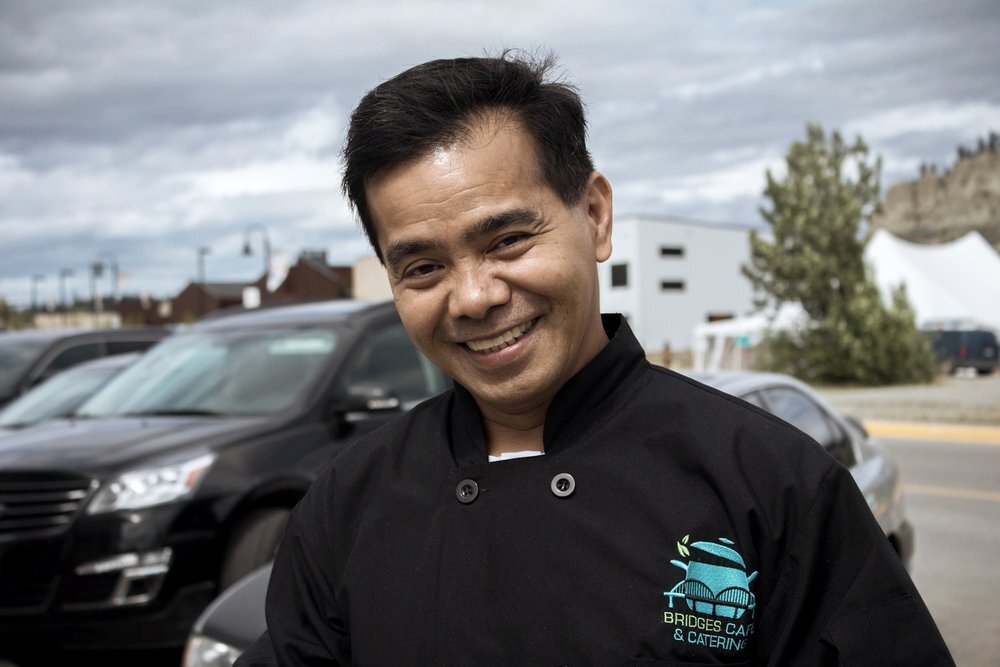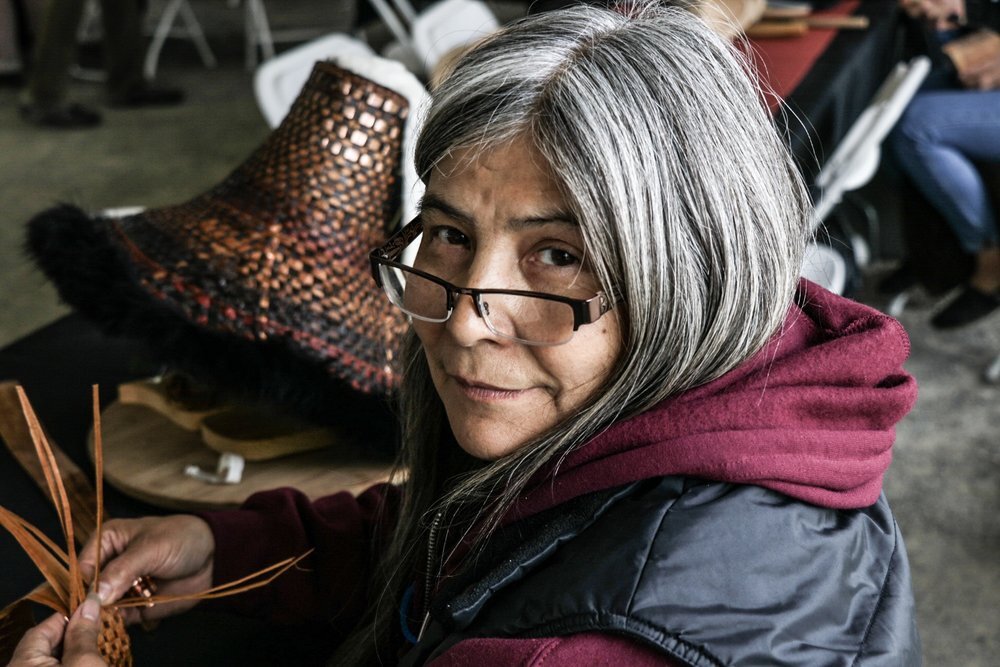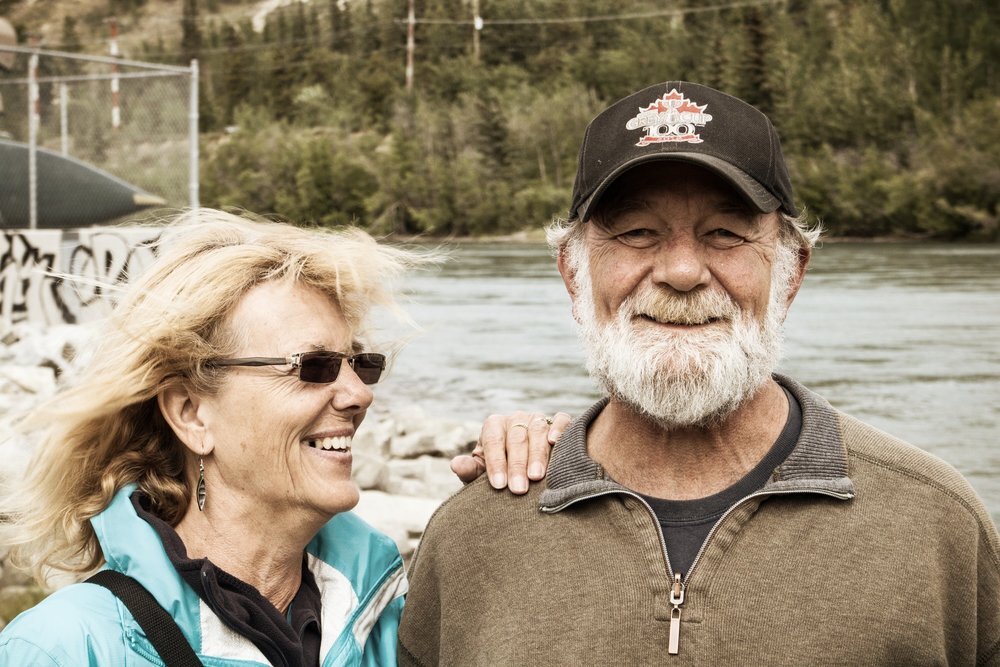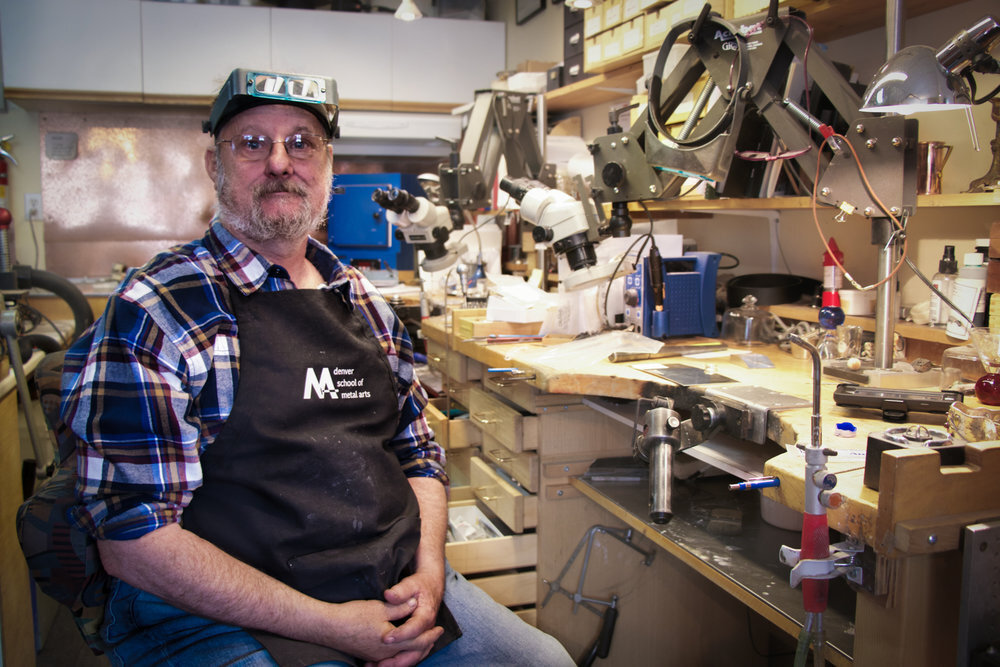CANADA 150 NORTH OF 60
For many people, this Canada Day weekend is about celebrating a significant birthday. For many others, the sesquicentennial represents a whitewash of history and a failure to acknowledge the diversity, sweat and tears that combined to make Canada what it is today.
A sign at the Canada Day parade in Whitehorse marked the birthday as 150 years of Indigenous resistance.
Stories North is an experiential learning initiative that has brought 14 journalism students and one linguistics student from Carleton University to the Yukon for one month. We’re learning and listening and trying to grasp what it means to live in this part of the North.
At a time when conventional narratives tend to limit understanding and the potential for creative, productive shifts in relationships, we are looking for ways to privilege other perspectives.
Here’s is a video that we put together from Canada Day. We used the national anthem as spoken word, part of our quest to see in new ways.
The Yukon is a diverse place. It’s a vast territory. It’s also a community.
Let’s celebrate that.
WAYNE JIM
“We’re not forgotten,” Wayne Jim says with a chuckle.
Wayne Jim says when he thinks of Canada 150, he first thinks of the country’s birthday. He also thinks of the First People that were here, the type of life they had, and their relationship with the newcomers.
“To me sometimes, some ways it kind of is a bad feeling kind of because a lot of the treatment and all the stuff that came with the First Nations and the newcomers I thought was not exactly good. But, you know, It’s 150th, we managed to survive that in that light, in a light that we’re actually working together and are starting to see more and more First Nations culture being involved and integrated into the new modern world today.”- Wayne Jim, Kwanlin Dün First Nation. Whitehorse, Yukon.
LUANN BAKER-JOHNSON
Luann Baker-Johnson was born in Uranium City, Saskatchewan but grew up in the Yukon. She left for 30 years to travel and live around the world, returning to the Yukon every summer with her family. She now lives in Whitehorse where her glassblowing studio operates. Luann says that for her, Canada’s 150th birthday means comfort.
“I am 59. My generation has been a very lucky generation. I mean look, we are normal, average Canadians, and we managed to build a glassblowing studio in the Yukon. In many countries in the world that would be absolutely impossible. It means comfort, and not necessarily monetary but as in satisfaction and happiness. One hundred and fifty years gives you a chance to think about all those things
DAN SHORTY
Dan Shorty was born, raised, and still lives in the Yukon. He is a member of the Tlingit First Nation and is currently working on project called “Dań Kwanje 'Á-Nààn: Voices Across the Water” that involves the construction of four traditional Indigenous watercraft. Dan says this project demonstrates how Canada’s sesquicentennial ought to be celebrated.
“We’ve been making this boat for about 37 days now, and all along the way people have been coming in and just sharing in the whole process… Yukon First Nations, Indigenous culture here. This culture’s been having a resurgence. There’s all kinds of exciting, wonderful things happening. We’d really love to share that with Canada and the rest of the world.”
SARAH BEGGS
Sarah Beggs hails from Elliot Lake, Ontario. She has been working in Dawson City for eight years and this is the first year that she has decided to stay for the winter – marking her transition from “cheechako” (newcomer) to “sourdough” (seasoned Northerner). As Canada celebrates 150 years, Sarah says she wants other Canadians to recognize the uniqueness of the North and specifically the Yukon.
“My best friend brought me up here eight years ago… I was not sure what to expect, but it was great and I decided to stay… Once you’ve been up here it kind of grabs a hold of you. It’s a place unlike any other, it’s so vast and big. You just need to come see it and experience it to understand.”
RICARDO RAMIREZ
Ricardo Ramirez was born in Mexico City. He has spent eight years in the Yukon, on and off, and is now living in Dawson City, working in the recycling depot. As a new Northerner, Ricardo says Canada’s 150th birthday has him feeling awed by the health of Canadian land and its Northern territory.
“It’s still pristine. It’s not crowded with people, it’s not overpopulated. The Yukon is the best place to spend 150 years in Canada… It’s a secret place, you know? That’s the beauty of this place, that not everybody is here.”
CHARLES BENJAMIN JOHNSON
Charles Benjamin Johnson – Ben, to his friends – has spent 51 years living and working in Dawson City. He grew up in Whitehorse, Yukon. As a child, he was sent to Choutla Residential School in Carcross. For Ben, Canada’s sesquicentennial calls to mind the history of First Nations people. “We were here first, and we’ll be here. Won’t get rid of us. 150 years? Two thousand years we’ve been here, older than that. They tried to take the Indian out of us. They tried it with me, and everybody else. We’re still here.”
RYAN TITUS
Ryan (Levi) Titus is a 20-year-old Tr’ondëk Hwëch’in citizen, living and working at the community’s Long Time Ago Cultural Centre in traditional Tr’ochëk territory. He educates visitors on the history of the land and his people — a different history compared to the colonial narrative of the Gold Rush and potential economic prosperity in the North. There is evidence the Tr’ondëk Hwëch’in First Nation has been living on their traditional territory for over 14,000 years, something Titus sees as proof they have been fine living off the land in their small community long before settlers arrived. Many people only recognize Dawson City as a hub for gold and fortune that popped into existence during the Gold Rush, but there is always two sides to every story.
“For a lot of First Nations across Canada, Canada 150 symbolizes more of colonization and for us that’s not who we are as people. We have this long history of us way before 150 years ago. For us it is definitely a different story, and I think there are kind of expectations for us for what to do for Canada 150 as a Culture Centre, but I think we’re just going to do something casual, because it’s not really something that we have a specific, big resentment to or anything anything. I guess we already know who we are as a nation and where we come from.”
BILL DONALDSON
Bill lives in a cave on the west bank of the Yukon River in Dawson City. He has lived there for 21 years — but he assures us he has made improvements. “At first it was kind of a tarp over it, now I’ve got an actual wall, a real door, windows, and curtains. I have two-burner stoves, LED lights and I don’t have Internet, but I have a computer with a lot of hard drives.”
“When you’re a kid you’re raised to be all patriotic and stuff. Maybe as you get older you get a little more cynical and you start to see a lot of things that have gone in the name of patriotism that aren’t so wise or well thought out.” He says Canada Day in Dawson isn’t a big deal, but there’s an annual parade that goes through town.
“In a lot of ways in Dawson, the treatment of natives here compared to the treatment of the natives in other parts of Canada is actually pretty good,” he says. “There’s all kinds of stuff going on here. Artists in-resident, song-writers in-residences, writers in-residences. It’s in the middle of no where, and yet there’s culture. It’s amazing the shit that comes through Dawson considering we’re at the end of the freaking road.”
Bill Donaldson, 53, Dawson City, YT.
JACKIE CLANCY
Jackie Clancy was born on the east coast, and after a childhood of moving across Canada with her parents, she decided to come north. She has been living in Dawson for 40 years now and spends her retired days selling hand-crafted herbal medicine. Living in the North, Clancy enjoys the benefits of the isolation from the government and the tourists who travel through her town every year.
“The reality is this town wouldn’t exist without tourists. And they’re so interesting. The coolest thing is you don’t have to travel to go around the world. You talk to them and you go to every place.”
Clancy says Canada’s 150th anniversary is a representation of the growth of the nation and the tourists who will continue to come to the north.
“We’re happy about 150 because the country is maturing and with that maturity there are even more benefits. I would tell someone who hasn’t been here to just come and experience the freedom, the fresh air, the clear water, and the safety. Big time.”
JOEL DUMLAO
Joel Dumlao is a Whitehorse chef who moved to Canada from the Philippines in 2008. In 2012, he moved to the Yukon to escape the hustle and bustle of a big city and enjoy the serenity of a quiet place. For Dumlao, Canada’s anniversary is about all Canadians coming together.
“Everybody has their rights. The equality, the freedom of speech, your right to vote, your right to do what you want. But as long as it is still under the rules of the law, everybody should be called equal. Co-existing, you know?”
LINDA BRENNAN
“Well I think back to what Canada 100 was when I worked in Montreal at Expo. So, 150 years, we’ve got a lot to be proud of. I’ve been out of the country for a few years and I’m back for the summer and I’m back now for the full summer but I’ve seen a great change in the way the country has developed and in the facilities that are here for people and so as time goes on, we see people coming here from all over the world and we have more connection to the First Nations people here and it seems like a really accepting, inclusive community here in the Yukon.” -Linda Brennan, Whitehorse, Carcross shop clerk.
AMY SOLLOWAY
Amy Solloway, from Nova Scotia, has been dancing at Diamond Tooth Gertie’s in Dawson City for nine summer seasons.
On Canada 150:
“I’m kind of at odds with it, to be honest, because of the Aboriginal treatment. It’s well and good to be ‘rah-rah’ that our country is old, but at what cost?”
On Dawson City: “It’s a place of extremes. It can be extremely welcoming or it can be isolating. The slogan is ‘North of Ordinary,’ and it really is. There’s nothing ordinary about anyone who lives here. You could be at the casino and your Blackjack dealer is a reiki master.”
“If you get a chance to come here, come. Even if you have just a tiny spark of adventure in you, come up.”
LAWRENCE CAULEY
Lawrence Cauley was lounging in the grass beside the Yukon river, casually reading the Scientific American Mind magazine before he started his cleaning shift at the River View Hotel. “I camp out most of the time, up in the clay cliffs or by the river,” he said. “I’m well aware of how you get energy from the ground, so I’m conscious about spending as much time outdoors as I can, eh.”
He first came to Whitehorse in 1981, and went back and forth before landing permanently in 1997 – a common narrative among Yukoners. He said he wouldn’t move back to Ottawa, his hometown, or anywhere in the south. This is his home now.“I’m not so keen on promoting the Yukon, because what’s here has nothing to do with the political jurisdiction of the Yukon. It’s the wilderness.”
I was thinking to myself what Canada will be like in 150 years from now. I figure whatever we imagine, it won’t be like that. It’s just inconceivable and we won’t know.”
DEBRA MICHEL
Debra Michel, a member of Sts’ailes Lhawathet Lalem First Nation, takes holidays to work at the Cultural Adäka Festival. A cedar artist from Atlin, B.C., she says she prefers not to celebrate Canada 150, because of the loss of land that occurred within it, but she is okay with those who disagree with her point of view. “People today, we weren’t a part of the past,” she says. “It’s just a belief.”
In the next 150 years, she says she hopes people will learn to get along, a return to the clan system, where sharing and supporting one another means no one is ever hungry. When she isn’t weaving cedar – a material that holds its own meaningful story - Michel works as a family support worker. She says she values cultural centres like the one of the Kwanlin Dün. It’s important for children to have playgrounds and a place to go. “We’re not going to change if it’s not our children,” she said.
NANCY HAGER
Nancy Hager, born and raised in Mayo, Yukon, is a former deputy chief of the Na-Cho Nyak Dun First Nation and is a member of the Crow Clan. She’s leading workshops on moose hair tufting and porcupine quilling during the Adaka Cultural Festival in Whitehorse.
“I’m not here to celebrate Canada Day or Canada 150. First Nations have been here quite a bit longer than that.
If you look at the booth over there, the Canada 150 booth, there are no First Nations there. There are only white people there.”
BRANDIE WILLMAN
Brandi Willman, a Parks Canada guide in Dawson, says Canada 150 is a great celebration for all. “I think it’s bringing everybody together," she says. " I think there’s reason to celebrate.”
As a First Nations member from Manitoba, she says she's never even considered 150 to be controversial, even if Indigenous Peoples have been there much longer.
For the celebrations, she says she hopes everybody can join in the fun. “I think Canada is just that great melting pot and everyone comes together,” she says.
EILEEN VANCE-DUCHESNE
Eileen Vance-Duchesne was standing outside a gas station, quietly watching a group of youth paint a mural on the wall of the laundromat nearby, one of the many projects she supports. Eileen is assistant to the chief of Kwanlin Dun First Nation, Doris Bill. As a prominent member of the community, she is reticent to talk about herself and tends to speak from the perspective of the community. As assistant to the chief, it’s not about her; it’s about the community.
“Generally here in Whitehorse, First Nation people are not celebrating Canada 150. Our Chief is not speaking on Canada Day. She generally would, but as because of Canada 150 and feeling that First Nations have been here long before that and because of that they feel kind of left out of the celebrations."
MICHAEL SHALLINGER
We’d seen Michael Shallinger fishing across the river hours before. He was flicking the line back and forth in an art called fly fishing. When we approached him, he didn’t know the time, said he’d lost track. He made the flies that were placed on his jacket, a testament to all of his years spent fishing. He told us he came to Canada for all the space, of which Yukon has a ton. He’s from a small town in Germany, one whose residents began living there 900 years ago.
“It’s interesting that it’s only 150 years old,” he said, chuckling. “We have a national day but it’s not that big of a deal. I like the big event though.”
“It’s sweet though because there’s a ton of wild spaces here, not as many people as in Europe. That’s kind of why I’m here, I love the outdoors.”
ASHLEY CUMMINGS
Name: Ashley Cummings, Cultural and Heritage Interpreter, Student
Hometown: Pangnirtung, Nunavut
Current Residence: Whitehorse
“I’m proud to be Canadian. The federal government has done a lot to harm Indigenous people in the past, especially with the Indian Act and residential schools, but despite all those things, we are Canada’s First Peoples, whether we are Inuit, First Nations, Metis, and despite the wrongs that have been done to us, I’m still proud to be Canadian. This is still my home and despite all the bad, we have done a lot of amazing things both as an Indigenous resilient group that has overcome all of these issues, but we’ve also done a great job at making sure we’re not forgotten — that we’re still in the present is still so important. I’m still unhappy with all that has been put into Canada 150 because I still have family and friends that have been put on boil water advisories for years and years, so that part is a bit hard. Yet, regardless, Canada is my home.”
TAREEF JAAMOUR
Tareef Jaamour is a Syrian refugee. He immigrated to Canada and enrolled in the student refugee program at Yukon College just over 10 months ago. It’s hard for him to think about his past, but he’s thankful to be living in the Yukon now. When he thinks of Canada he thinks of the opportunity he was given.
“The First Peoples here had their land taken by the Europeans yes and it is sad to hear, but so much has happened since that time. Now Canada is about multiculturalism. If it wasn’t for the way Canada is now, I wouldn’t be here. She was the only one to welcome me. I’m here and that’s something great. I love Canada for that reason. She deserves to celebrate.”
VIKTORIA MUHLBAUER
Name: Viktoria Muhlbauer
Hometown: Hamburg, German
Current Residence: Whitehorse, Yukon
Occupation: Travel Counselor
“I’m excited that I’m able to be in Canada for the entire year that it’s Canada’s 150th birthday. It is a special year. I do think we need to be aware that First Nation people have been here before. But, I’m really excited to celebrate it here, see what the government put together, the funding given to all the provinces in territories to celebrate and party in Canada. I think it’s a little different here because the North wasn’t really explored until the gold rush happened so that makes it a little different. We have a right to celebrate it because Canada is made up of immigrants and of people who have moved from other provinces and territories and it’s important for them to celebrate it too. I just think the Yukon and all the northern territories are a little bit different because the Indigenous people were here before and it is their land and they were here long before that. It’s a great reason to celebrate but not okay to ignore the fact that people were here before.”
SHERYL ROST VAN TONNINGEN
Hometown: Edmonton, Alberta
Occupation: Floral Clerk
“My boss told me to put the 150 on the Canada flag on the door. I said I didn’t want to offend any Indigenous people because I know what they’re saying and I’ve listened to the news, so to be respectful of their views on it, that’s why I didn’t, but I’m still okay with the flag because we are in Canada. Thinking of Canada 150, I just felt bad for the Indigenous people because we live so closely together. I’m from down South, from Edmonton in Alberta, where they still have reserves. Even now it seems like a bad, dirty word because it’s horrible to go down there and see that and hear that because we live together up here. My kids go to school where they learn First Nations languages, practices. My daughters been accepted in their dance group even though we don’t have any Indigenous background at all. They accept us and we accept them up here and that’s why I didn’t want to put the 150 up there, out of respect for them. We all get along up here and I love it up here because of that. More people need to come up here and see that!”
MIKE & DEBORAH
We wanted to be somewhere special to celebrate Canada Day. We thought Whitehorse would be the best place.
"We're from Peterborough, Ontario and I think in the South we tend to ignore the Indigenous culture more or less. We certainly have a lack of understanding and acknowledgment what Indigenous have been through. I think down South we… we're too white."
"It is a different tone up North - it's more focused on Indigenous for sure. It's wonderful and great. They're our original people.
BLAIR THORSON
“We’re going to need lots of candles eventually. I was 10 years old when we had the 100th birthday. There were lots of special things, special coins representing the centennial. Here we are 50 years later and it’s even more commercialized. We waste so much on special years and anniversaries. The country has been a lot older than that, people have been here forever, but it's how people have been assimilated and how it’s affected them. This country has always been a melting pot. To me, Canada 150 doesn’t mean anything more than a celebration and a get together of people. Next year will be 151. I think it’s nice to bring people together and just try to get along.
Blair Thorson is an artist originally from a First Nation located just outside of Edmonton, Alberta. He has been living in Whitehorse for 20 years, and says living as a First Nation’s man in the North is very different than living in the South. He says he tries to educate his own family about these differences and people in the North, as he is the only one of his family living in north of 60. He is most popularly known for his watercolour paintings done over maps of Northern land. Each piece is original. Thorson says there is a story behind each painting and it’s connection to the location it’s painted over, often reflecting historical or cultural stories.
DAVID ASHLEY
“Canada is a country with an underlying sense of social justice and although this process isn’t perfect, it is universal. So, at Canada’s 150 there is a national dialogue relating to native people and colonialism. It’s not a perfect dialogue but it is a nationwide dialogue and it’s an undertaking of all Canadians to move forward politically in a better direction, of all political stripes. Certainly there are pockets of insanity but as a national movement it’s very real and I’d say, pretty well accepted and that to me is the most important thing that’s happening right now for Canada’s 150.”

























